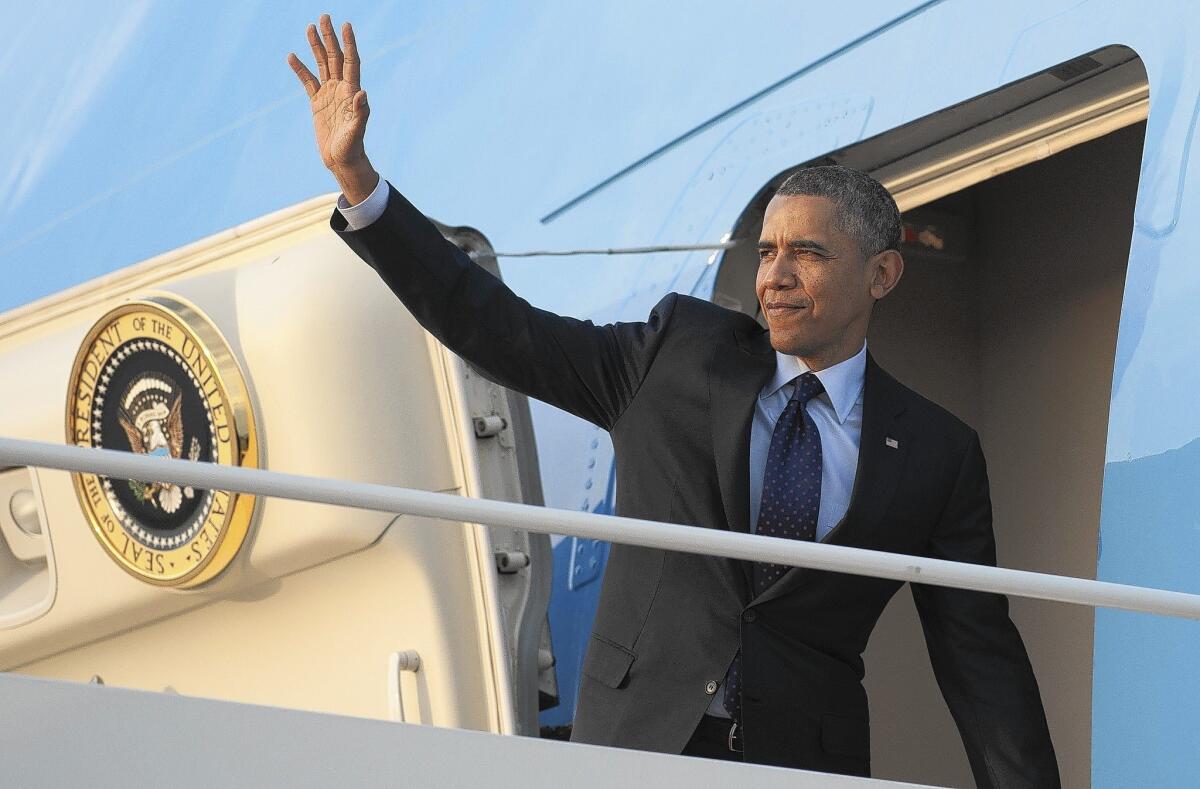President Obama making reassurance tour of Europe

- Share via
Reporting from Warsaw — On the heels of a major speech vowing to preserve U.S. power overseas, President Obama is visiting European capitals this week on a now-familiar mission: reassuring allies that the U.S. has not forgotten its role in guaranteeing their security.
Obama’s four-day trip to Poland, Belgium and France is packed with diplomacy — and potential drama — as Western leaders rattled by Russia’s meddling in Ukraine navigate an uneasy new relationship with Moscow and look to Washington for support.
The reassurance tour is a something of a replay of Obama’s swing through Asia last month, when Japan, South Korea and other allies nervous about China’s growing clout sought similar promises from a U.S. president increasingly under pressure for his reluctance to wield U.S. military power in distant conflicts.
Here in Poland, Obama will meet Ukrainian President-elect Petro Poroshenko and discuss ways to bolster his fragile government as it battles separatists it says are backed by Russia.
He may run into Russian President Vladimir Putin at a long-planned ceremony in France honoring the 70th anniversary of the D-day landings. The face-to-face interaction would be their first since Putin seized Ukraine’s Crimean peninsula in March, sparking an international crisis and scrambling Obama’s foreign policy agenda.
The White House says Obama is focused on expressing support for Poroshenko’s incoming government and on pressuring Putin into dialogue on Ukraine. Recent signs that the Russian leader is interested in easing tensions are welcome but tenuous, said Ben Rhodes, Obama’s deputy national security advisor.
“We see these separatists in the east and the south, who we believe enjoy the support of the Russian government, continue their efforts to commit acts of violence and to destabilize Ukraine,” Rhodes said. He said Moscow could sway those militias and move toward peace talks.
“That’s the opportunity that is available to Russia,” he said. “Should they not take it, they will continue to face the isolation that they’ve been confronted with.”
As Obama left Washington on Monday, however, the Ukraine crisis was not easing. According to the government in Kiev, the capital, about 500 Russian separatists attacked a base for Ukraine border guards Monday near the eastern city of Luhansk, one of the largest such attacks since the unrest began early this year.
On Monday, the White House announced that Vice President Joe Biden will lead a delegation to Kiev this weekend.
With the situation tenuous, U.S. and European leaders are trying to decide how far they want to go in isolating Putin.
French President Francois Hollande is slated to meet privately with Putin on the eve of the Normandy ceremonies, which will be on Friday. Putin and Obama are not scheduled to meet, but White House aides do not rule out an “informal” interaction at a leaders’ lunch.
In a major speech Wednesday in Warsaw, Obama will reaffirm America’s commitment to NATO members in Eastern Europe. Although the North Atlantic Treaty Organization has bolstered its presence with new military exercises, Poland’s leaders have sought a permanent NATO troop presence. U.S. officials have not commented on the request.
Obama tried to answer his foreign policy critics last week in an address at the U.S. Military Academy at West Point. He said the U.S. needs strong allies and partners, whether dealing with terrorists or rising regional powers, and vowed to intervene when U.S. core interests are at stake.
“That speech didn’t help him overseas,” said Andrew Kuchins, director of the Russia and Eurasia program at the nonpartisan Center for Strategic and International Studies in Washington. “There’s a lack of clarity and a lot of contradictions, as well as a defensiveness to it.”
Now, he said, “the Europeans are particularly worried that the pivot to Asia means further neglect of European security issues. And that all mixes together and increases the concern.”
Obama’s trip is laden with reminders of the stakes involved in European security.
When he lands in Warsaw on Tuesday, Obama will celebrate 25 years since Poland’s Solidarity movement overturned communist rule and the country held free elections. On Wednesday, he’ll deliver remarks in Royal Square, the site of Solidarity demonstrations three decades ago.
Obama will also take part in ceremonies at Omaha Beach and Sword Beach to commemorate the 1944 D-day invasion. The president won’t just focus on the past, Rhodes said.
“The work is not done in terms of securing a Europe that is whole, free and at peace,” he said.
Times staff writers Christi Parsons and Paul Richter in Washington contributed to this report.
More to Read
Sign up for Essential California
The most important California stories and recommendations in your inbox every morning.
You may occasionally receive promotional content from the Los Angeles Times.














